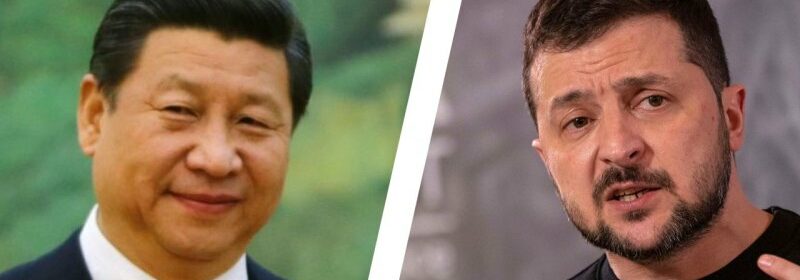Why did Xi call Zelensky now?

Save articles for later
Add articles to your saved list and come back to them any time.
Russia’s war in Ukraine has been going on for more than a year. More than 40,000 people have been killed and 14 million displaced. So, why did Chinese President Xi Jinping call Ukrainian leader Volodymyr Zelensky for the first time on Wednesday?
“There are three things to note in terms of the context of the phone call,” said Dr Sonia Mycak, a Ukrainian Studies Foundation in Australia research fellow at the Australian National University.
Firstly, the phone call took place on the anniversary of the Chernobyl nuclear disaster. Russia currently occupies the Zaporizhzhia nuclear power plant, the largest in Europe, placing it at grave risk of a nuclear accident much greater than that of Chernobyl.
Chinese President Xi Jinping and Ukrainian President Volodymyr Zelensky.Credit: AP
Beijing has been on the fence throughout the conflict, but it has been steadfast in its warnings over any nuclear fallout, which could have a direct impact on its northern regions that border Russia.
“On the nuclear issue, all relevant parties must stay calm and exercise restraint, truly act in the interests of their own future and that of humanity, and jointly manage the crisis,” Xi said according to an official summary of the call released by China’s Ministry of Foreign Affairs.
Secondly, Japan’s Prime Minister Fumio Kishida visited Ukraine in March at the same time as Xi was visiting Russian President Vladimir Putin in Moscow.
The spectre of Beijing’s great Asian rival visiting Kyiv put regional pressure on Xi to show leadership after months of speeches promoting China’s alternative vision for global security.
Finally, the phone call came three days after China’s ambassador to France Lu Shaye made public comments casting doubt on the sovereignty of former Soviet states.
“These ex-USSR countries don’t have actual status in international law because there is no international agreement to materialise their sovereign status,” Lu said.
The envoy’s claim, which suggested Beijing did not view Ukraine as a sovereign state, drew immediate condemnation in Europe and a rare retraction from the Chinese Foreign Ministry.
Xi emphasised China’s official position on the phone call with Zelensky.
“Mutual respect for sovereignty and territorial integrity is the political foundation of China-Ukraine relations,” he said.
Xi was then uncharacteristically defensive in his official statement.
“Everything China does is above board,” he said. “Dialogue and negotiation are the only viable way forward.”
Washington and Brussels have been calling for Xi to speak to Zelensky since Putin announced the invasion just weeks after standing on a balcony with Xi during the Winter Olympics in Beijing.
Xi has resisted, preferring to meet Putin in Moscow and Samarkand in Uzbekistan, while using the past year and Russia’s dwindling military fortunes to strengthen economic and diplomatic control over his northern neighbour.
At the same time, China has proposed a 12-point peace plan for Ukraine as part of its push to challenge the diplomatic primacy of the United States.
Russian President Vladimir Putin (right) and Chinese President Xi Jinping at a dinner in Moscow in March.Credit: AP
Da Wei, professor and director of the Centre for International Security and Strategy at Tsinghua University, said China was “playing an irreplaceable role some nations have failed to achieve”.
“The United States and some other Western countries have perceived the crisis as a confrontation between two blocs, and they labelled China as part of one of the blocs,” he told Chinese state media.
Da blamed that division for preventing Xi from being able to pick up the phone to Zelensky, arguing it “added difficulty to China’s communication” with Ukraine.
Li Yongquan, head of the China Society for Russian, Eastern European and Central Asian Studies, said there was an economic imperative for the intervention.
“As the crisis lingers, there will be more casualties, economic recession and there will be greater threats to security in Europe and the Eurasian region,” he said.
But experts outside China are sceptical that Beijing’s newfound communication with Zelensky would achieve any real breakthrough.
“In my view, any discussion between Ukraine and China is a positive step, but there is an obstacle in China-Ukraine dialogue in that the Chinese statement maintains that negotiation aiming for a ‘political settlement’ is the only viable way forward,” Mycak said.
“But for Ukraine, a military defeat of Russia and the return of all occupied territory is the only option.”
Zelensky made it clear that he had little interest in China’s political solution and did not reference Xi’s 12-point plan.
“No one wants peace more than the Ukrainian people,” he said in a statement after the call. “There can be no peace at the expense of territorial compromises.”
Despite the differences, Mycak said it was in Zelensky’s interest to accept the call despite China’s apparent neutrality so far.
“Firstly, because in engaging in dialogue with Beijing, there is always a chance that China might alter its position somewhat,” she said.
“Secondly, because Ukraine’s established trade relationship with China has been very lucrative and if that can be further developed, Ukraine will benefit from much-needed funds for its war-ravaged economy.”
Get a note direct from our foreign correspondents on what’s making headlines around the world. Sign up for the weekly What in the World newsletter here.
Most Viewed in World
From our partners
Source: Read Full Article

